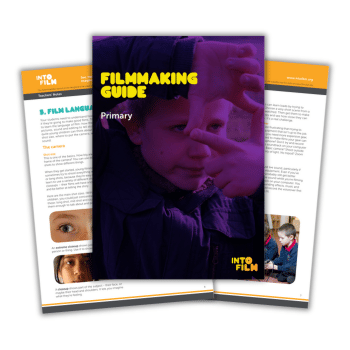5 Reasons Why Film Should Be Taken Seriously

Paul Reeve, CEO of Into Film, explains why film has an important role to play in school classrooms, not just after-school clubs…

- by Paul Reeve

Does film have a serious role to play in education? Recently this question has been the subject of much debate and it’s one I am pleased to be a part of.
As CEO of Into Film I challenge the view, held by some, that film in schools belongs only in film clubs or media courses. Whilst I wholeheartedly endorse film clubs (since our organisation supports a network of many thousands in schools across the UK), it is also my firm belief that film has a valuable role to play in every classroom. Here’s why…
1. It’s an influential art form
Film is an artform, arguably the most influential of the last century. It depicts great stories from our histories and of contemporary life, and is a central element of our shared cultural heritage.
Film clubs provide a fantastic vehicle through which pupils can discover and explore its repertoire, and learn its language. However, film, like all the arts, shouldn’t just be confined to extra-curricular activity. Learning about it should be an entitlement for all children and young people as an integral part of their cultural education.
Like all good art, it can enable us to imagine and understand the world differently, better understand ourselves,and see things through the eyes of others. Additionally, so much today is communicated through the moving image that surely it’s imperative to equip students with the tools to ‘read’ it; to understand how stories are being told and meaning is being constructed.
2. It supports literacy attainment
There’s an emerging body of evidence (a recent example being the Leeds Partnership’s ‘Improving Literacy Through Film‘ programme) that using film in the classroom is particularly effective in contributing to the development of literacy – not least (but certainly not only) in students who find this challenging.
Film is, after all, a text; skills and confidence developed through engagement with film are directly transferable to the written word.
3. It’s a cross-curriculum resource
Film is an effective resource for teaching and learning right across the curriculum. A well chosen and contextualised film clip or short film (and occasionally a feature-length one) can help bring learning to life, stimulating thought and understanding, and acting as a springboard for lively classroom discussion and debate.
This includes certain PSHE themes and issues that can be challenging to open up with students; Into Film’s‘Anti-Bullying on Film’, ‘Staying Safe Online’ and ‘Refugee Week’ resources, for example, have all been consistently popular with teachers.
I loved this comment I read recently from a history teacher – “Until they invent a time machine, film is essential to bring the subject alive”.
4. The benefits of filmmaking
Filmmaking can achieve numerous positive outcomes for students. It helps to develop creativity, team-working, communication and ICT skills, in addition to the specifics of filmmaking itself – all of which are potentially valuable for future employability.
As I sat down to start writing this piece, a team member in my organisation came over to tell me about an animation project she’d just returned from. The teacher of the participating class said she’d never seen the students more focused and motivated, or collaborating so well.
Just as importantly, learning how to make film can empower young people to tell their own stories and become active participants in the making of culture – not just consumers of other people’s. Filmmaking carries further potential as a simple, yet useful tool to record learning and use this for assessment and peer-to-peer sharing of information.
5. It’s enjoyable and accessible for all
Children and young people enjoy film; a key reason why it should be taken seriously! It forms part of most students’ cultural experience, and is a medium to which they can relate and with which they feel comfortable, right across the age range. That presents a wonderful opportunity to use it to help achieve memorable, enjoyable learning.
There’s another significant factor here that many teachers have highlighted. Because the vast majority of students are generally familiar and comfortable with film, this creates a level playing field when they come to engage with it.
I’ve witnessed on numerous occasions how children who face challenges in their educational progress flourish when discussing, critiquing or making films, working confidently alongside their peers – often for the first time.
Paul Reeve is CEO of Into Film – a UK-wide education organisation supported by the BFI through Lottery Funds, which aims to put film at the heart of young people’s learning and personal development. For more information, visit www.intofilm.org or follow @intofilm_edu





